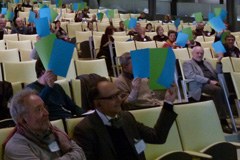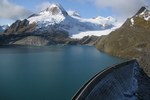News
"Landscape is not renewable"
Oct 17, 2013
/
alpMedia
Must the Alps really be squeezed to the last drop so they can contribute yet more to the energy transition? The CIPRA annual conference on "The Alps as a Water Trough" saw more passionate debate on this topic than any other.

Image caption:
A central statement of the CIPRA annual conference was that there is no further potential for the Alps to provide more hydro power. © CIPRA International
Water power may once have brought prosperity to remote regions, said Mario Broggi in his opening presentation to the CIPRA annual conference held from 10 to 12 October 2013 in Bozen/Bolzano, Italy. But enough is enough. "There is no weighing up of the benefits compared to the value of the landscape", he stated. The energy transition is becoming merely an empty phrase, with the aim being to weaken environmental legislation.
Broggi, who at the beginning of the 1990s worked on the Swiss federal law governing the protection of waters, today states: "Some hydroelectric plants should never have been built." Only now are we recognising the major ecological effects that have led to a "slight decline in diversity". "Hydroelectric power may be renewable, but the affected landscape is not", says the former Chairman of CIPRA International, who just the day before had received the 2013 EuroNatur prize.
We must decide for tomorrow today
Rising temperatures are causing changes in water supplies. The water runoff from glaciers will not slow down until 2050 at the latest, says George Kaser from the Institute for Meteorology and Geophysics at the University of Innsbruck, Austria. The Alps will then lose their function as a drinking water reservoir. Having worked as a scientist on the UN's fifth IPCC report, he states: "We must decide today which direction to take - we will only notice the difference in 30 to 40 years' time. As producers of greenhouse gases we also have a responsibility to those in other affected regions."
Desire for energy is destroying the bases of life
People in the Alps consume above-average quantities of energy, make a more than average contribution to global warming and are particularly affected by the consequences. Is there a solution?
The message from Bozen/Bolzano was that energy policy alone cannot solve the problem. The energy transition can only be made sustainable if we consume less energy, which in turn means we must know its true costs; we also need a global strategy and a change in values. For decisions to be sustainable, they must both be transparent and involve civil society.
Further information: www.cipra.org/de/jf2013 (de/fr/sl/it), www.euronatur.org/EuroNatur-News.english.0
Broggi, who at the beginning of the 1990s worked on the Swiss federal law governing the protection of waters, today states: "Some hydroelectric plants should never have been built." Only now are we recognising the major ecological effects that have led to a "slight decline in diversity". "Hydroelectric power may be renewable, but the affected landscape is not", says the former Chairman of CIPRA International, who just the day before had received the 2013 EuroNatur prize.
We must decide for tomorrow today
Rising temperatures are causing changes in water supplies. The water runoff from glaciers will not slow down until 2050 at the latest, says George Kaser from the Institute for Meteorology and Geophysics at the University of Innsbruck, Austria. The Alps will then lose their function as a drinking water reservoir. Having worked as a scientist on the UN's fifth IPCC report, he states: "We must decide today which direction to take - we will only notice the difference in 30 to 40 years' time. As producers of greenhouse gases we also have a responsibility to those in other affected regions."
Desire for energy is destroying the bases of life
People in the Alps consume above-average quantities of energy, make a more than average contribution to global warming and are particularly affected by the consequences. Is there a solution?
The message from Bozen/Bolzano was that energy policy alone cannot solve the problem. The energy transition can only be made sustainable if we consume less energy, which in turn means we must know its true costs; we also need a global strategy and a change in values. For decisions to be sustainable, they must both be transparent and involve civil society.
Further information: www.cipra.org/de/jf2013 (de/fr/sl/it), www.euronatur.org/EuroNatur-News.english.0




